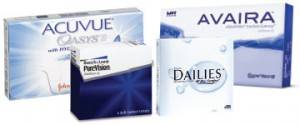 We want to make sure that you receive all of the information that you need to make educated decisions about your eye health. Our eye doctors, Dr. Kao and Dr. Park are always available to answer your questions. Please feel free to send us your eye care questions to administrator@loudouneyeassociates.com
We want to make sure that you receive all of the information that you need to make educated decisions about your eye health. Our eye doctors, Dr. Kao and Dr. Park are always available to answer your questions. Please feel free to send us your eye care questions to administrator@loudouneyeassociates.com
Q: What does it mean to be “legally blind” ?
Dr. Kao: “Legally blind” doesn’t just mean that you wear glasses with thick lenses. The term “legally blind” actually means that your best seeing eye cannot be corrected to better than 20/200 visual acuity.
In other words, if you could see the 20/200 letters on a visual acuity chart with either your glasses or contact lenses, then you are not legally blind.
However, you could also be deemed legally blind if you have a visual field or peripheral vision of under 20 degrees, also considered tunnel vision.
Q: What are some of the qualifications for being a good LASIK candidate?
Dr. Park: Some of the qualifications include having healthy eyes, good general health, corneas that are not too thin, stable vision, a prescription that is not too high, realistic expectations, and be at least 18 years of age. Loudoun Eye Associates is a TLC affiliate office, and we will work together with them to ensure that you are a good candidate for laser refractive surgery before proceeding.
Q: I have seasonal allergies. How come my eyes are still itchy even after I take a Claritin pill?
Dr. Kao: You may need an anti-allergy eye drop to target the symptoms in the eye. Much of the time, oral anti-allergy medications are not that effective at treating the symptoms in the eye. In fact, oral anti-allergy medications can cause dry eyes which then worsen the symptoms due to allergies. Depending on the severity of the symptoms, either over-the-counter or prescription-strength eye drops can be prescribed to provide relief.
Q: Can I swim with my contact lenses?
Dr. Park: Swimming with soft contact lenses should be avoided whenever possible. Swimming with rigid gas permeable contact lenses should always be avoided. Viruses and various microbes in the water can attach to the contact lenses and cause eye infections, irritation, and even sight-threatening corneal ulcers.
If you must swim with contact lenses, the best way to reduce these risks is to wear waterproof swim goggles. The FDA actually recommends that contact lenses should not be exposed to any kind of water. This includes water in swimming pools, hot tubs, salt water, and even showers.
Q: What are some foods I could eat to keep my eyes healthy?
Dr. Kao: Foods rich in vitamins C and E, lutein, zeaxanthin, beta-carotene, zinc and omega-3 fatty acids would be helpful. Here are some examples:
Vitamin C citrus fruits, berries, tomatoes and broccoli Vitamin E vegetable oils, wheat germ, nuts and legumes Lutein and zeaxanthinBeta-carotene carrots, pumpkin, sweet potato and spinach Zinc oysters, beef and other meats, nuts Omega-3 fatty acids kale, spinach, broccoli, peas, corn, colored bell peppers cold-water fish (sardines, herring, salmon and tuna. esp wild-caught)
Q: Do I need to use an anti-glare filter on my computer screen?
Dr. Park: Anti-glare filters for the computer can be effective at reducing reflections from the computer screen, which may improve comfort for some. However, computer screen anti-glare filters will not help if you have eye fatigue due to visual problems associated with the constant focusing and refocusing of the eyes while working on computers. An evaluation with your eye doctor may determine that you may need prescription computer eyewear.
Q: Do I need to wear my sunglasses when it is cloudy out?
Dr. Kao: Yes. Although UV rays may be less intense on a cloudy day, they can still pass through the clouds and cause damage to the eyes. Sunglasses that provide 100% UV protection are important to wear on both sunny and cloudy days in order to protect your eyes from cataracts, macular degeneration, corneal damage, as well as noncancerous and cancerous growths on the eye and the eyelids.
Q: What are some foods I could eat to keep my eyes healthy?
Dr. Park: Foods rich in vitamins C and E, lutein, zeaxanthin, beta-carotene, zinc and omega3 fatty acids would be helpful. Here are some examples: Vitamin C: citrus fruits, berries, tomatoes and broccoli Vitamin E: vegetable oils, wheat germ, nuts and legumes lutein and zeaxanthin: kale, spinach, broccoli, peas, corn, colored bell peppers Beta-carotene: carrots, pumpkin, sweet potato and spinach Zinc : oysters, beef and other meats, nuts Omega-3: fatty acids cold-water fish (sardines, herring, salmon and tuna- especially wild-caught)
Q: Can I swim with my contact lenses?
Dr. Kao: Swimming with soft contact lenses should be avoided whenever possible. Swimming with rigid gas permeable contact lenses should always be avoided. Viruses and various microbes in the water can attach to the contact lenses and cause eye infections, irritation, and even sight threatening corneal ulcers. If you must swim with contact lenses, the best way to reduce these risks is to wear waterproof swim goggles. The FDA actually recommends that contact lenses should not be exposed to any kind of water. This includes water in swimming pools, hot tubs, salt water, and even showers.
Q: Does my child need a full eye examination if she already passed her vision screening at school?
Dr. Park: Yes, a yearly comprehensive eye examination performed by an eye doctor is important! It includes careful testing of many aspects of your vision and eye health that a vision screening would generally not address. Many vision screenings only test distance visual acuity, which is only one small part of a person’s overall eye health. It is estimated that 1520% of school children have vision problems that a basic screening would likely miss.
Q: I have seasonal allergies. How come my eyes are still itchy even after I take a Claritin pill?
Dr. Kao: You may need an anti-allergy eye drop to target the symptoms in the eye. Much of the time, oral anti-allergy medications are not that effective at treating the symptoms in the eye. In fact, oral antiallergy medications can cause dry eyes which then worsen the symptoms due to allergies. Depending on the severity of the symptoms, either over the counter or prescription strength eye drops can be prescribed to provide relief.
Q: Does my child need a full eye examination if she already passed her vision screening at school?
Dr. Park: Yes, a yearly comprehensive eye examination performed by an eye doctor is important! It includes careful testing of many aspects of your vision and eye health that a vision screening would generally not address. Many vision screenings only test distance visual acuity, which is only one small part of a person’s overall eye health. It is estimated that 15-20% of school children have vision problems that a basic screening would likely miss.
Q: Why do my eyes tear up when I am reading or spending time in front of a computer?
Dr. Kao: This may be due to a decreased rate of blinking as you concentrate on reading or working on the computer. When you blink less, less tears are pumped out of the tear drainage system, leading to a welling of the tears. Also, if you have an unstable tear film in conjunction with a decreased rate of blinking, this could lead to reflex tearing. Patients who experience this often have evaporative dry eye, which could be diagnosed with some additional testing.
Q: My previous eye doctor told me I have “stigma!” Am I going to go blind?
Dr. Park: Absolutely not! Astigmatism is a common finding much like nearsightedness and farsightedness. It is not an eye health problem but rather a problem with how the eye focuses light. An eye with astigmatism usually has an irregularly shaped cornea that causes light to focus at multiple points, either in front of, behind, or in front of AND behind the retina.

